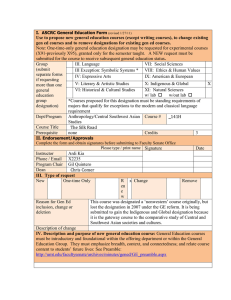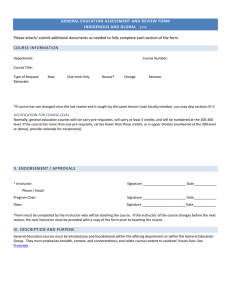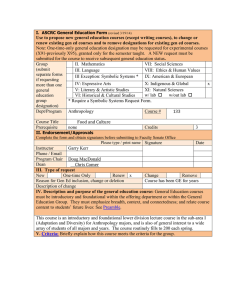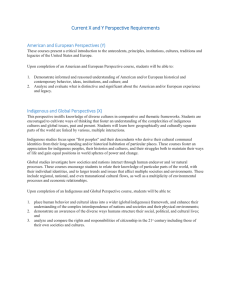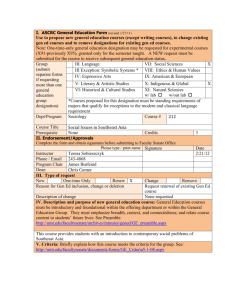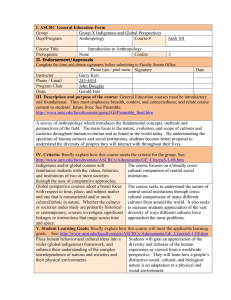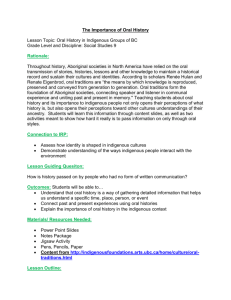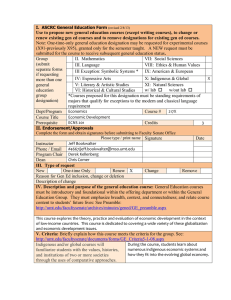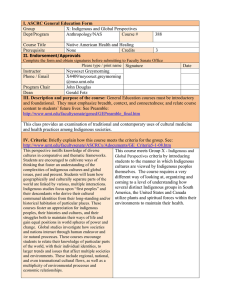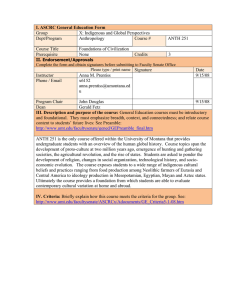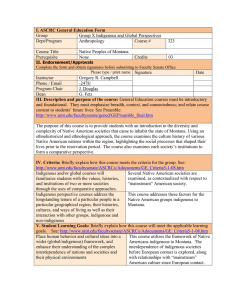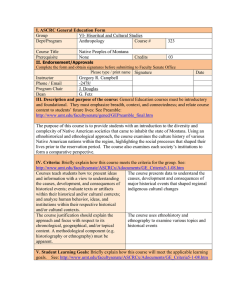I. ASCRC General Education Form (revised 9/15/09) Use to propose
advertisement
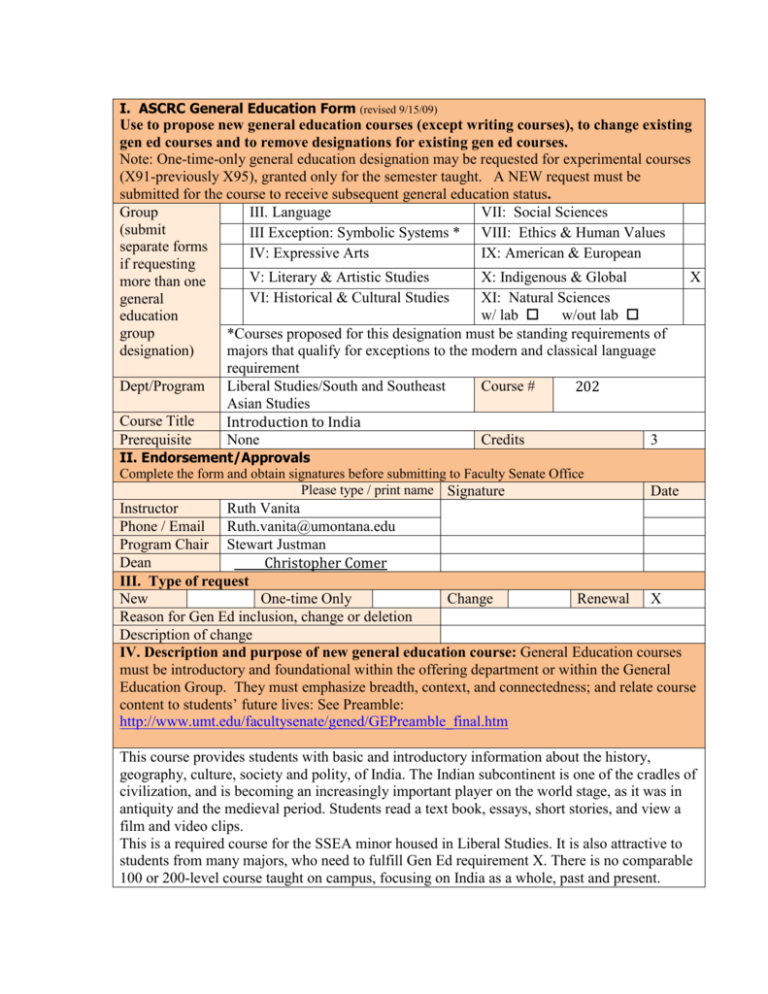
I. ASCRC General Education Form (revised 9/15/09) Use to propose new general education courses (except writing courses), to change existing gen ed courses and to remove designations for existing gen ed courses. Note: One-time-only general education designation may be requested for experimental courses (X91-previously X95), granted only for the semester taught. A NEW request must be submitted for the course to receive subsequent general education status. Group III. Language VII: Social Sciences (submit III Exception: Symbolic Systems * VIII: Ethics & Human Values separate forms IV: Expressive Arts IX: American & European if requesting V: Literary & Artistic Studies X: Indigenous & Global X more than one VI: Historical & Cultural Studies XI: Natural Sciences general w/ lab w/out lab education group *Courses proposed for this designation must be standing requirements of designation) majors that qualify for exceptions to the modern and classical language requirement Dept/Program Liberal Studies/South and Southeast Course # 202 Asian Studies Course Title Introduction to India Prerequisite None Credits 3 II. Endorsement/Approvals Complete the form and obtain signatures before submitting to Faculty Senate Office Please type / print name Signature Date Instructor Ruth Vanita Phone / Email Ruth.vanita@umontana.edu Program Chair Stewart Justman Dean Christopher Comer III. Type of request New One-time Only Change Renewal X Reason for Gen Ed inclusion, change or deletion Description of change IV. Description and purpose of new general education course: General Education courses must be introductory and foundational within the offering department or within the General Education Group. They must emphasize breadth, context, and connectedness; and relate course content to students’ future lives: See Preamble: http://www.umt.edu/facultysenate/gened/GEPreamble_final.htm This course provides students with basic and introductory information about the history, geography, culture, society and polity, of India. The Indian subcontinent is one of the cradles of civilization, and is becoming an increasingly important player on the world stage, as it was in antiquity and the medieval period. Students read a text book, essays, short stories, and view a film and video clips. This is a required course for the SSEA minor housed in Liberal Studies. It is also attractive to students from many majors, who need to fulfill Gen Ed requirement X. There is no comparable 100 or 200-level course taught on campus, focusing on India as a whole, past and present. V. Criteria: Briefly explain how this course meets the criteria for the group. See: http://www.umt.edu/facultysenate/ASCRCx/Adocuments/GE_Criteria5-1-08.htm This course introduces students to the values, Indigenous and/or global courses will histories and institutions of several diverse familiarize students with the values, communities living in India, such as Sikhs, histories, and institutions of two or more Hindus, Muslims, south Indians and north societies through the uses of comparative Indians. approaches. We look at how Indian history and culture Indigenous perspective courses address the longstanding tenure of a particular people in from ancient times to the present, and how Indian communities have interacted with a particular geographical region, their histories, cultures, and ways of living as well each other and with people who have entered India from elsewhere, such as Turkish, as their interaction with other groups, Persian and other middle eastern Muslims, indigenous and non-indigenous. and the British. We look at a very wide range of Indian Global perspective courses adopt a broad focus with respect to time, place, and subject cultures and societies, with tremendous matter and one that is transnational and/or linguistic, regional and religious diversity, multi-cultural/ethnic in nature. Whether the undergoing change, from antiquity to the present. cultures or societies under study are primarily historical or contemporary, courses investigate significant linkages or interactions that range across time and space. VI. Student Learning Goals: Briefly explain how this course will meet the applicable learning goals. See: http://www.umt.edu/facultysenate/ASCRCx/Adocuments/GE_Criteria5-1-08.htm - 1. place human behavior and cultural We examine Indian culture and society ideas into a wider (global/indigenous) from many different perspectives, framework, and enhance their ancient, medieval and modern. understanding of the complex interdependence of nations and societies and their physical environments; 2. demonstrate an awareness of the diverse ways The course focuses on the vast diversity of humans structure their social, political, and cultures, societies and polities in India in cultural lives; the past and the present. 3. analyze and compare the rights and The course examines India as a republic st responsibilities of citizenship in the 21 century and a secular democracy with including those of their own societies and comparable but different institutions in cultures. the US VII. Justification: Normally, general education courses will not carry pre-requisites, will carry at least 3 credits, and will be numbered at the 100-200 level. If the course has more than one pre-requisite, carries fewer than three credits, or is upper division (numbered above the 200 level), provide rationale for exception(s). VIII. Syllabus: Paste syllabus below or attach and send digital copy with form. The syllabus should clearly describe how the above criteria are satisfied. For assistance on syllabus preparation see: http://teaching.berkeley.edu/bgd/syllabus.html Attached Please note: Approved general education changes will take effect next fall. General education instructors will be expected to provide sample assessment items and corresponding responses to the Assessment Advisory Committee.
